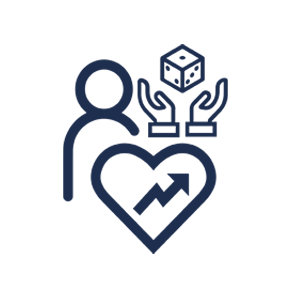
World-class online training to strengthen player protection standards & effectively safeguard consumers from harms. Informed by ‘lived experience’ & relevant to the latest LCCP requirement
6 ONLINE TRAINING PROGRAMMES
Discount for Bacta, Gambling Business Group and Bingo Association Members, £45 instead of £75!

The aim of this programme is to raise learner awareness of customer vulnerability, to support your organisation’s own safer gambling initiatives. Learners will explore what is meant by vulnerability, why it is important to recognise it and how this can help your organisation in fulfilling its corporate responsibilities.
By the end of the workshop learners will be able to:
- define the term ‘vulnerability’
- describe the purpose and importance of social responsibility
- understand what is meant by ‘customer vulnerability’
- identify potentially vulnerable groups
- understand and describe the factors that can trigger vulnerability
- identify types of vulnerability

- This 2-part programme explores gambling-related harms within the context of individuals, families and communities.
Part A: Learners will understand the factors that can make people more vulnerable to gambling-related harms and how recreational gambling can get out of control.
Part B: This section is told through the eyes of Joe and his journey through gambling addiction. Learners will be introduced to the work of psychologist Dr Custer to help identify gambling-related harms in customers.
By the end of the workshop learners will be able to:
- describe gambling addiction theory
- describe the different types of gambling-related harm
- define the term gambling-related harm
- identify the three interplays that cause a loss of gambling control
- identify the factors that can change a customer’s relationship to gambling
- identify the factors that can make someone vulnerable to gambling-related harms, and how this relates to customer profiling
- identify the gambling-related harm impact on Joe and his family
- describe how these interplays can trigger vulnerability

This 2-part programme is designed to give learners the information and confidence to identify safeguarding and welfare issues, exploring legal responsibilities within the gambling industry.
Part A: Safeguarding at-risk groups focuses on safeguarding issues for children, young people and adults at risk who need to be referred to social services or the police in an emergency.
Part B: Managing welfare issues relevant to gambling is designed to help learners become more aware of what can make gamblers vulnerable, recognising when someone is at risk of gambling-related harms and support learners in being able to make an appropriate intervention.
By the end of the 2-part programme learners will be able to:
- describe what is meant by safeguarding and welfare in a gambling context
- show familiarity with important laws governing safeguarding and welfare in gambling
- understand the key steps in recognising and responding appropriately to causes for concern
- describe what steps should be taken where immediate harm is evident and explain how vulnerability and duty of care are defined in the gambling sector

Great communication skills are key to ensuring that our customers are safe.
Part A: Learners will discover what is meant by enhanced skills for customer interaction and what these skills are. Learners will see examples of customer interactions and learn the benefits of using enhanced skills.
Part B: Learners will build on skills from part A and will explore ways to have better and more meaningful communications with customers.
By the end of the 2-part programme learners will be able to:
- explain what enhanced skills for customer interaction are
- describe customer interactions where enhanced skills could be applied
- identify examples of enhanced skills for customer interactions
- explain the benefits of using enhanced skills in a customer interaction

The aim of this programme is to give learners the knowledge needed to signpost vulnerable customers towards help and
support. Learners will explore the organisations that support gamblers and the protections that are available to help customers take control when gambling becomes disordered.
By the end of the workshop learners will be able to:
- explain why knowledge of support services is important to your customers and to you
- describe the different types of support services available and what they do
- describe how the support services help people struggling with gambling-related harms
- describe some of the barriers that may prevent people from accessing these services, and how these may be overcome

The health and wellbeing of employees are of increasing concern to all organisations, and the gambling sector is no exception.
Dealing with customers who are expressing heightened and even extreme emotions can take its toll on an individual’s mental health and wellbeing, and this, in turn, represents a risk to the effectiveness of your organisation.
The aim of this programme is to raise awareness of situations that may cause stress or contribute to mental or physical health issues and to equip learners with tools, tips and techniques to help them to maintain their wellbeing and work-life balance.
By the end of the programme learners will be able to:
- describe what is meant by health and wellbeing
- identify factors that can negatively impact your health and wellbeing
- identify resources and tools that can contribute to overall wellbeing by supporting you to be better equipped and more confident about managing daily pressures